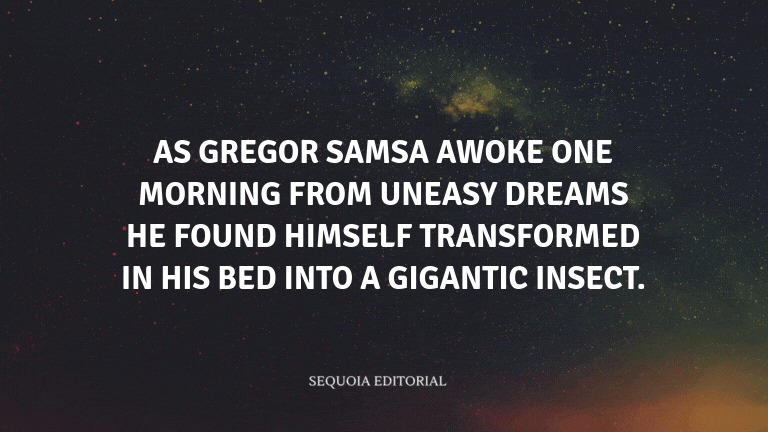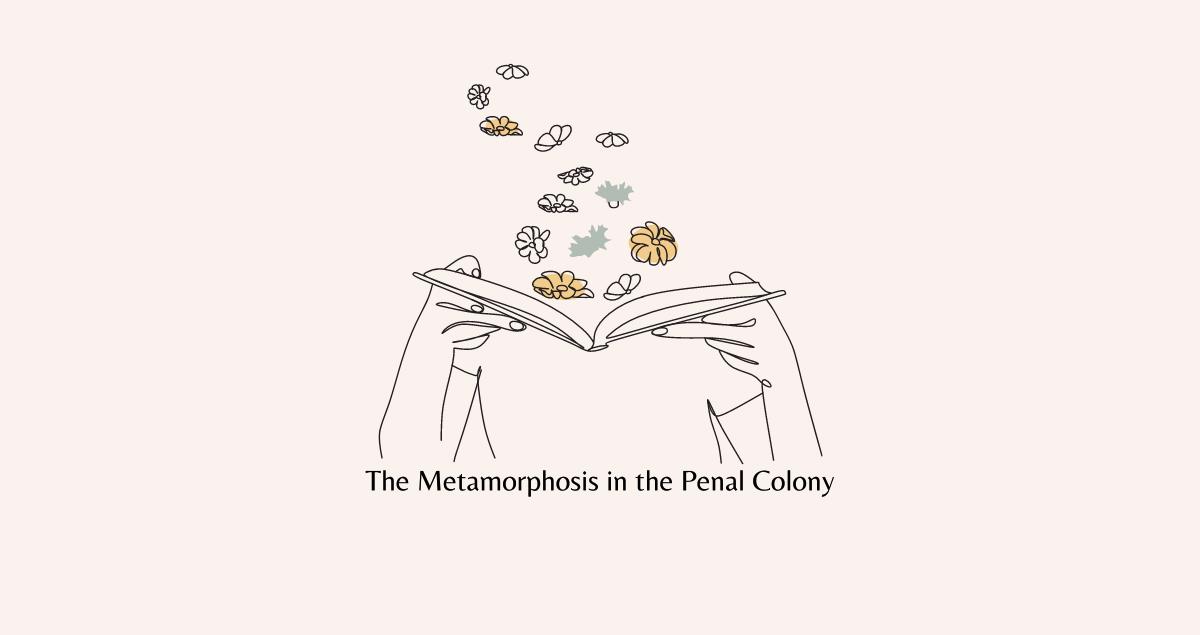The Metamorphosis In The Penal Colony is about the shocking transformation of Gregor Samsa into a monstrous insect and the subsequent impact it has on his family. The tale delves into themes of alienation, existentialism, and the human condition, and it is a somber reflection on the complexities of life and identity.
Table of Content
The Metamorphosis In The Penal Colony Book Summary
Gregor Samsa, a diligent traveling salesman, wakes up one morning to find himself transformed into a monstrous insect. The shock of this transformation is matched only by his family's subsequent horror when they see him.
As Gregor becomes increasingly isolated in his room, his family begins to adjust to life without his support. His sister, Grete, takes on the responsibility of caring for him, while his parents are too distressed to confront the situation.
Gregor's physical condition deteriorates, and his family's patience wanes. They start to view him as a burden, and their once-loving relationship with him disintegrates.
The family begins to rent out rooms to lodgers to make ends meet, adding to the claustrophobic and oppressive atmosphere in the household.
Despite his efforts to communicate with his family, Gregor is unable to bridge the gap between his insect form and their humanity. He remains an outcast within his own home.
Grete, who initially cared for Gregor, starts to resent him, and the rest of the family becomes openly hostile. They increasingly view him as a threat and a reminder of their past life.
During a somber evening, the lodgers witness Gregor's grotesque form for the first time. Their repulsion prompts the Samsa family to confront the reality of Gregor's transformation.
Gregor, sensing his family's desire to be rid of him, retreats to his room and dies alone and unloved. His death brings a strange sense of relief to the family, who now see a future free from the burden of his existence.
The family, now liberated, takes a day off to enjoy the outdoors. They reflect on their past and the possibilities of a new life that lies ahead without Gregor.
They move on with renewed vigor, acknowledging the hardships they faced. Grete, now a young woman, blossoms and looks forward to a hopeful future.
The story concludes with the family's acceptance of Gregor's metamorphosis and their willingness to embrace the changes that lie ahead.
The Metamorphosis In The Penal Colony Quotes
- As Gregor Samsa awoke one morning from uneasy dreams he found himself transformed in his bed into a gigantic insect.

- I cannot make you understand. I cannot make anyone understand what is happening inside me. I cannot even explain it to myself.

The Metamorphosis In The Penal Colony Ending Explained
At the end of The Metamorphosis In The Penal Colony, Gregor Samsa succumbs to his injury and dies alone in his room.
The Samsa family, finally free from the burden of Gregor's transformation, takes a tram ride out into the countryside, filled with a sense of relief and the prospect of a new beginning.
They enjoy a day together, contemplating the past and their future. The story closes on the image of Grete, the now grown-up daughter, stepping confidently into the sunshine.
Characters in book The Metamorphosis In The Penal Colony
- Gregor Samsa: The protagonist, a traveling salesman who wakes up to find himself transformed into a large insect.
- Grete Samsa: Gregor's sister, who initially takes care of him but later distances herself from him.
- Mr. Samsa: Gregor's father, who becomes hostile towards Gregor after his transformation.
- Mrs. Samsa: Gregor's mother, who is initially distressed by Gregor's condition but eventually grows accustomed to it.
- The Chief Clerk: Gregor's employer, who comes to the Samsa household to inquire about Gregor's absence from work.
- The Lodgers: Gentlemen who rent rooms in the Samsa household and are initially sympathetic towards the family's situation.
- The Samsa's Maid: A young woman hired to help around the house.
- The Samsa's Cook: The family's long-term cook who also assists with household chores.
- The Office Manager: The new chief of the firm where Gregor works, who visits the Samsa family to inquire about Gregor's absence from work.
Key Lessons
- Embrace Change: Life is full of unexpected transformations. Embracing change, rather than resisting it, is crucial for personal growth and adaptation.
- Value Empathy: The ability to understand and share the feelings of others is a fundamental aspect of being human. It creates strong connections and supports those in need.
- Seek Understanding: When faced with situations that are difficult to comprehend, seek to understand rather than judge, as this can lead to deeper connections and a broader perspective on life.
- Find Purpose: The search for meaning and purpose is a driving force in human existence. It's essential to find and pursue activities that give life significance and joy.
- Personal Identity: The core of our being is defined by more than just our physical appearance. It encompasses our thoughts, feelings, and actions, which shape our personal identity.
My Personal Opinion
Is The Metamorphosis In The Penal Colony worth reading? Totally! I found it to be a thought-provoking and haunting exploration of the human condition.
I was struck by the depth of emotion and the powerful themes woven throughout the narrative. The portrayal of Gregor's isolation and the subsequent impact on his family is both poignant and distressing. However, I have to admit, the bleakness of the story can be overwhelming at times.
I would recommend this book to readers who are interested in philosophical literature and psychological explorations. It's a challenging read, but it offers a unique perspective that can lead to profound introspection and discussion.

